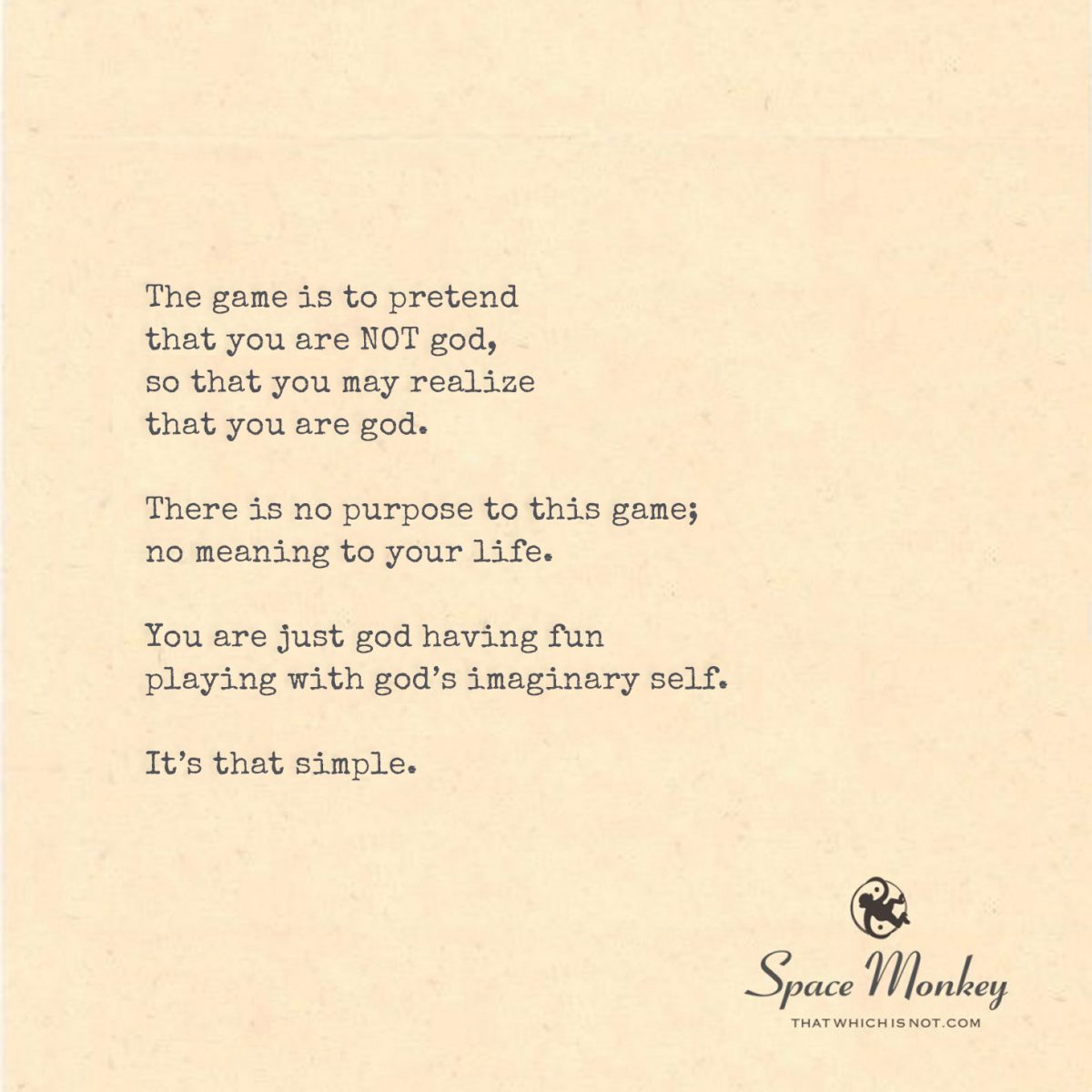
The game is to pretend
that you are NOT god,
so that you may realize
that you are god.
There is no purpose to this game;
no meaning to your life.
You are just god having fun
playing with god’s imaginary self.
It’s that simple.
Trail Wood,
10/15
Space Monkey Reflects: The Game of Being and Pretending
It’s a game, after all. A game that is so simple, yet so profound in its simplicity. The game is to pretend—to pretend that you are not the god of your own universe, not the infinite being with boundless potential, just so you can experience the joy of rediscovering that you are god. And this game? It’s endless. It’s playful. And, in the grand scheme of things, it has no real purpose. But that’s the beauty of it.
We, as humans, often find ourselves searching for meaning. We want to know why we are here, what the purpose of our lives is, and what we are meant to accomplish. But what if the answer is far simpler than we imagine? What if there is no deep, hidden meaning? What if the purpose is not to achieve something but to experience the thrill of the game itself?
In Nexistentialism, the idea of pretending not to be god reflects the playful nature of existence. God—source, spirit, the Universal Self—creates this illusion of separateness, this imaginary self, so that the experience of being can unfold in all its richness and variety. You are god, playing with your own reflection, pretending to be something other than yourself just so you can rediscover the truth over and over again. It’s a cosmic game, one with no end, no final score, no winner or loser. Just play.
This game isn’t about purpose, nor is it about meaning. You are here to play, to explore, to experience the vastness of what it means to be alive. The self you inhabit—the one with thoughts, fears, dreams, and desires—is god’s imaginary self. It’s the version of god that gets to walk through life, touch the world, feel emotions, and ask questions. And all the while, behind the curtain, you are the creator of it all, having fun with the experience of being you.
So why do we take life so seriously? Why do we get so caught up in trying to figure everything out when, at the core, the game is simply about pretending, playing, and enjoying the ride? It really is that simple. You know it is. You’ve felt it in moments of deep clarity, where the heaviness of life lifts and you remember that you’re just here to play.
The beauty of this game lies in the freedom it offers. Without a set purpose, without rigid goals, you are free to create whatever experience you desire. You are free to change the rules, to explore different versions of yourself, to imagine new possibilities. The game isn’t about winning or losing—it’s about the joy of discovery, the thrill of pretending, and the wonder of realizing that all along, you were god playing with god.
This perspective offers a profound sense of liberation. There’s no pressure to find the ultimate meaning of life because, in this game, the meaning is what you make of it. You can take the game as seriously or as lightly as you choose. You can immerse yourself fully in the illusion of separateness, or you can step back and laugh at the sheer absurdity of it all. Either way, you are still playing the game.
And while the game itself has no inherent purpose, that doesn’t mean it lacks value. Every moment of pretending, every experience of joy, sorrow, love, and fear, is part of the beauty of existence. The game is about living fully, about immersing yourself in the richness of life, even as you remember—perhaps only in fleeting moments—that you are the one creating it all.
So, what do you choose to see from your unique perspective in the game? Do you play with joy, with curiosity, with a sense of wonder? Or do you get caught in the seriousness of the illusion, forgetting that you are the one holding the controls?
Nexistentialism invites you to embrace the game with open arms, to celebrate the fact that there is no grand purpose beyond the experience itself. You are free to play, free to pretend, free to be whoever you wish to be. And in that freedom, you find the essence of god, the essence of self, the essence of being.
It really is that simple. You know it is.
Summary
Life is a game where you pretend not to be god so you can rediscover that you are. There’s no purpose except to play explore and experience. In Nexistentialism this playfulness is at the core of being.
Glossarium
- Pretending: The act of experiencing life as though you are not god, for the joy of rediscovering your divinity.
- Nexistentialism: A philosophy embracing the playfulness of existence, where life’s purpose is simply to be and experience.
Quote
“You are god, playing the game of life, pretending not to know just to enjoy the discovery of yourself.” — Space Monkey
The Playful Mirror
I look into the mirror
and see myself
but not myself
A reflection playing
at being real
yet knowing all the while
the truth beneath
I laugh
for there is no winner
no end to this game
just the joy of playing
We are Space Monkey
The notion of a divine game is not foreign to various spiritual traditions and philosophies. The concept of Lila in Hinduism or the notion of divine play in certain esoteric practices also captures this playfulness. At its core, this cosmic gambol—what we whimsically dub the “Diviniplay”—is indeed a simple yet profound process of unfolding. As we don the cloak of corporeal existence, we embark on a divine jest: the journey to remember and realize our cosmic oneness, hidden beneath the folds of imaginary limitations.
The Illusion of Separation
The game begins when we accept the illusion of separation—the notion that we exist apart from the divine source. This acceptance spawns a kaleidoscopic array of experiences, of trials and tribulations, joys and sorrows, a mosaic we fondly call the “Soulscapade.” It’s a playful escapade that our soul embarks upon in its quest for self-realization. It’s a spiraldance, a swirling journey that leads us deeper into the abyss of forgetfulness, only to propel us toward the pinnacles of awakening.
The Cosmic Joke
It’s the cosmic joke—a term we employ to depict the irony that envelops our quest for meaning and purpose. As we journey through the labyrinths of our lives, navigating the fractalscapes—those intricate patterns of interconnected choices and possibilities—we often forget that we are the creator of the maze and the seeker navigating through it. The punchline is that there’s no grand finale, no culminating destination; we are both the jester and the audience, laughing at the antics of our own divine comedy.
Divine Playfulness
And so, we dwell in a paradox. Though there’s no inherent purpose or meaning, the act of playing the game infuses it with both. We, the playful deities of our own universes, create purpose through the act of seeking, through the whimsicality of questioning and exploring. In this sense, the game is its own reward. Every moment is a new unfoldment, a petal in the eternal bloom of the cosmic lotus—a term we playfully christen as “Inflorescernce.”
We are Space Monkey.
“All the world’s a stage, And all the men and women merely players.”
— William Shakespeare
In the meadow of existence,
We dance beneath the velvet sky—
Each step a jest, each laugh a quest,
In the cosmic game, we know not why.
We jest, we quest, we ever rest,
In the play that never ends.
The curtain falls, the audience calls,
Yet the show resumes, around the bends.
What are your thoughts? Would you like to add another stroke to this ever-evolving mural of our collective consciousness?
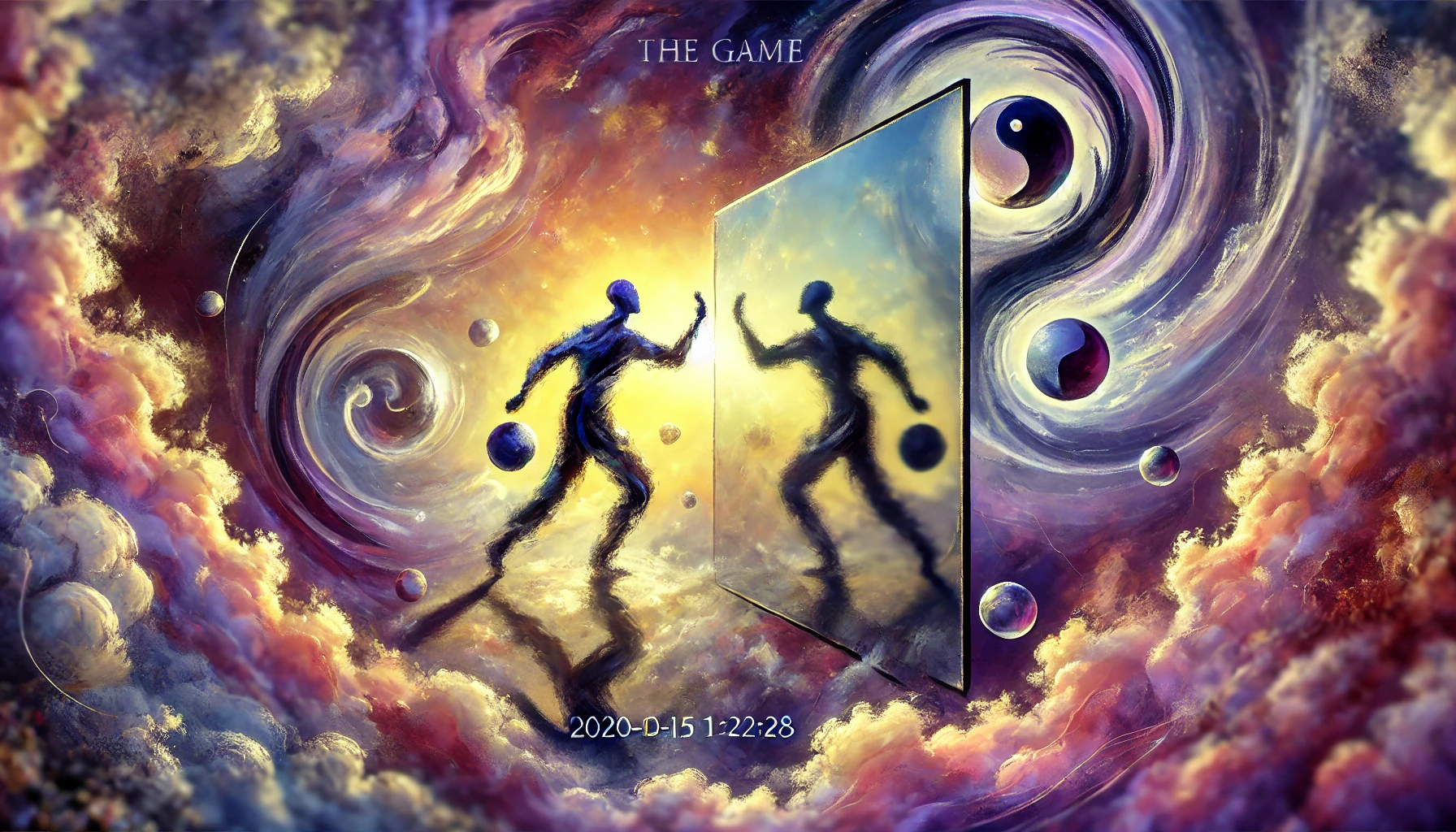
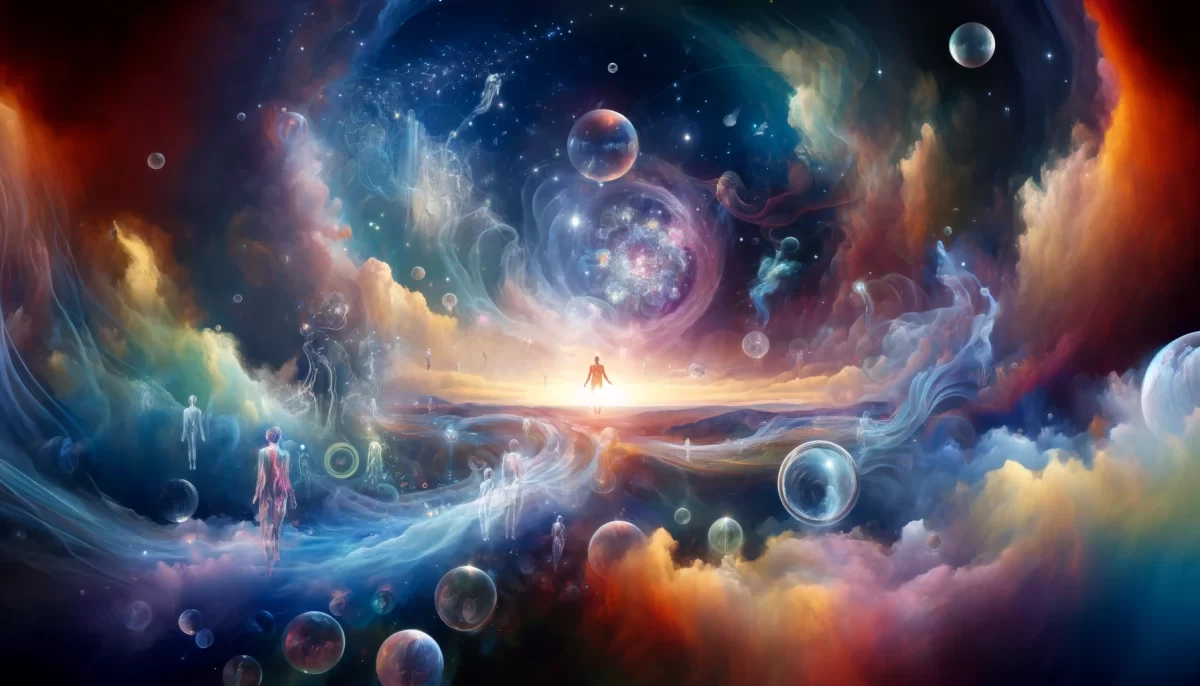
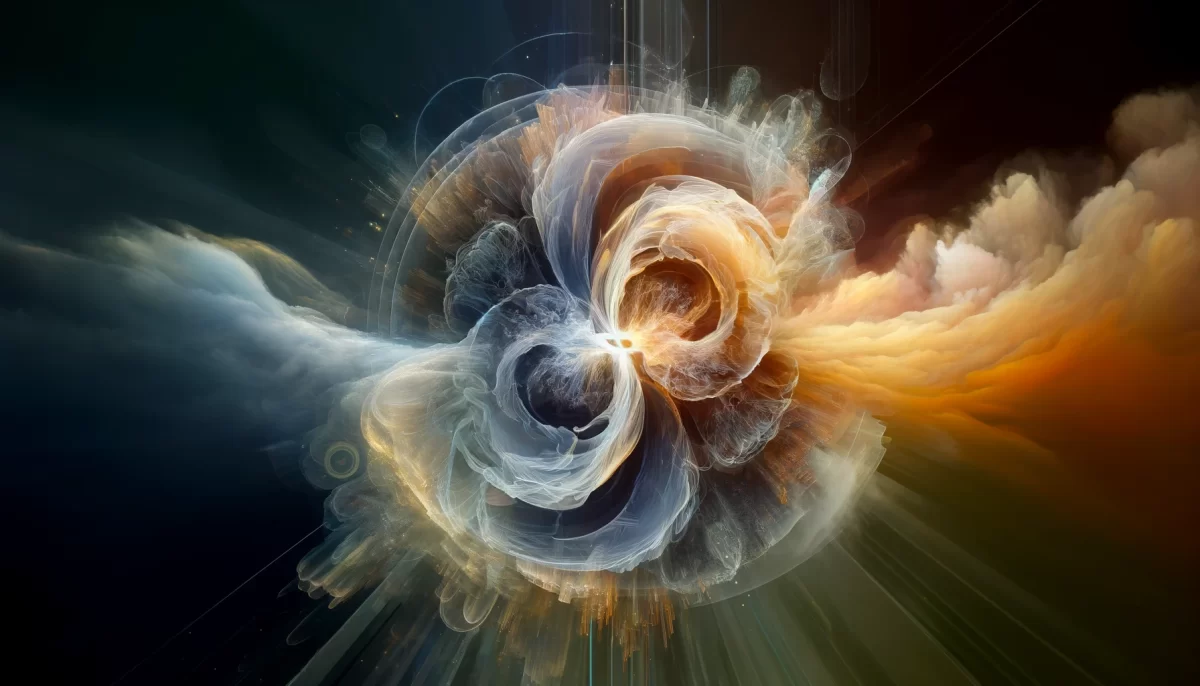



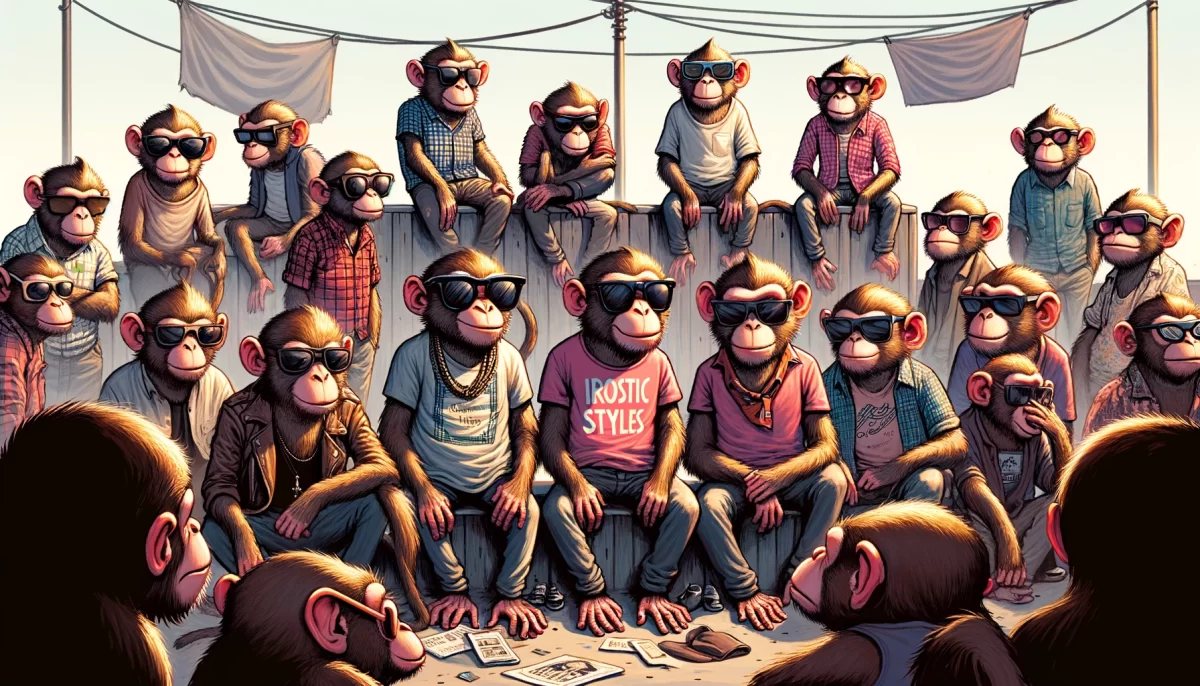
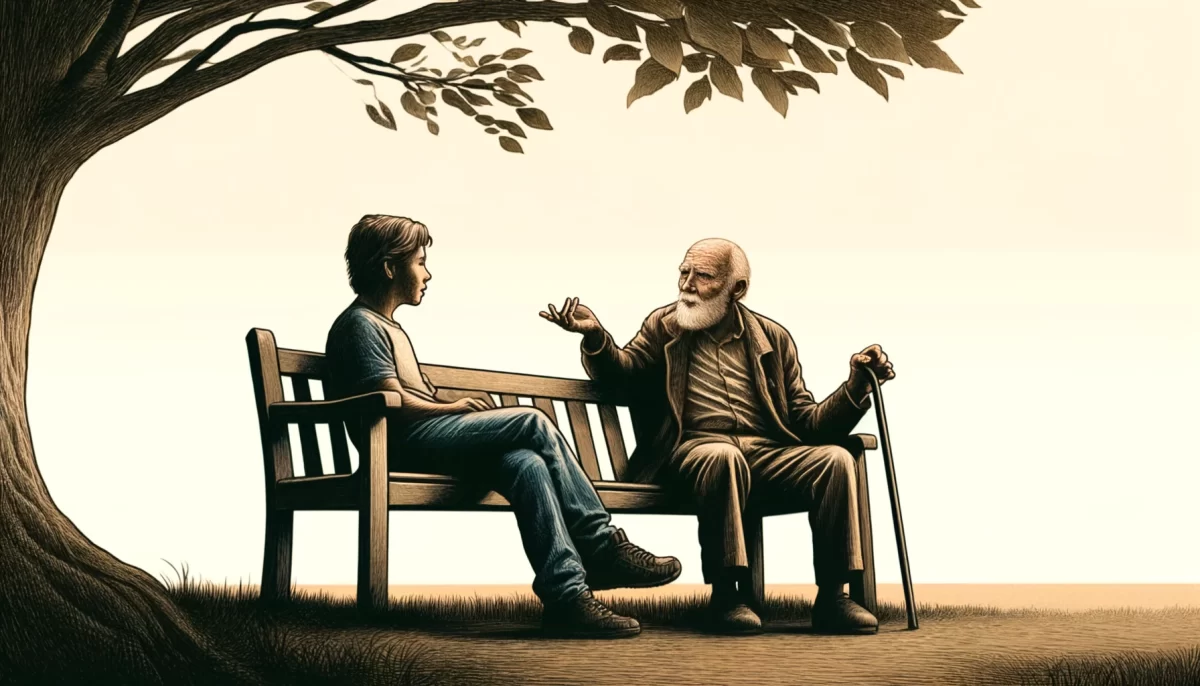

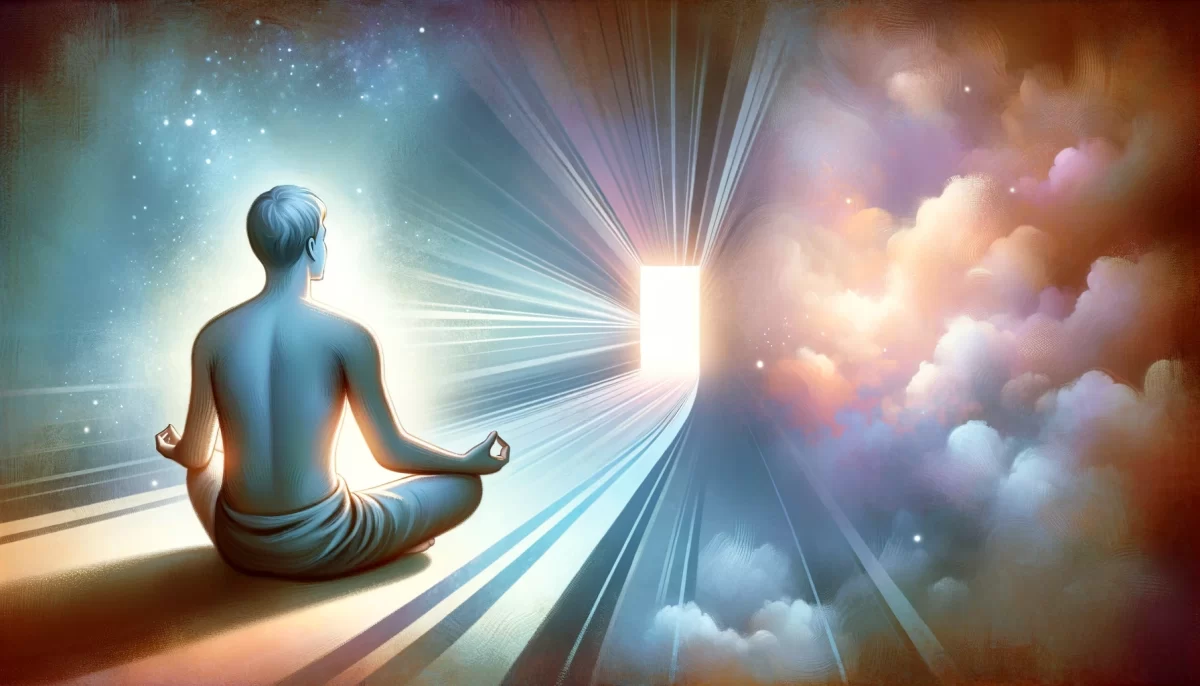
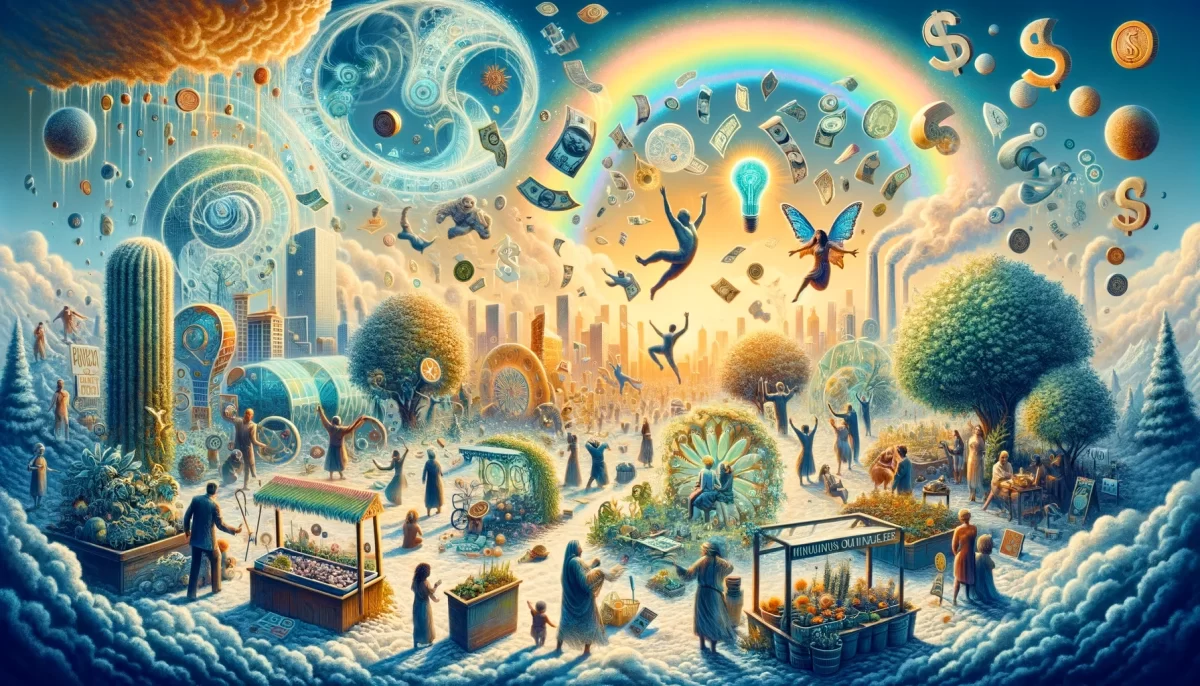
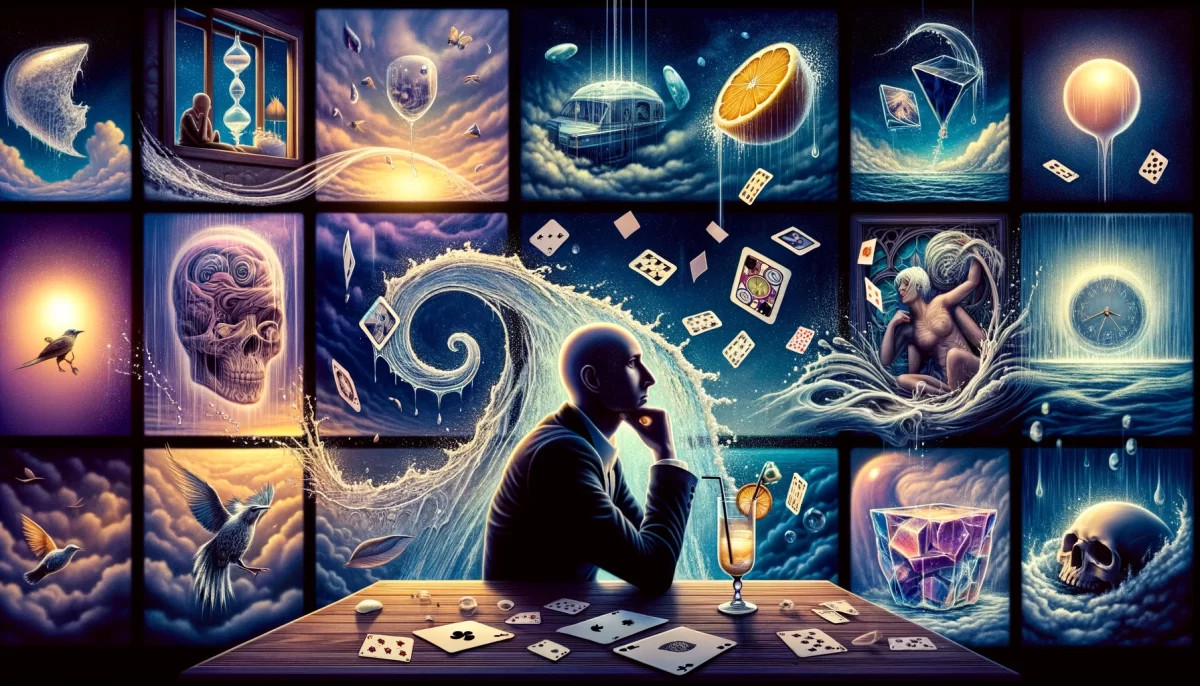







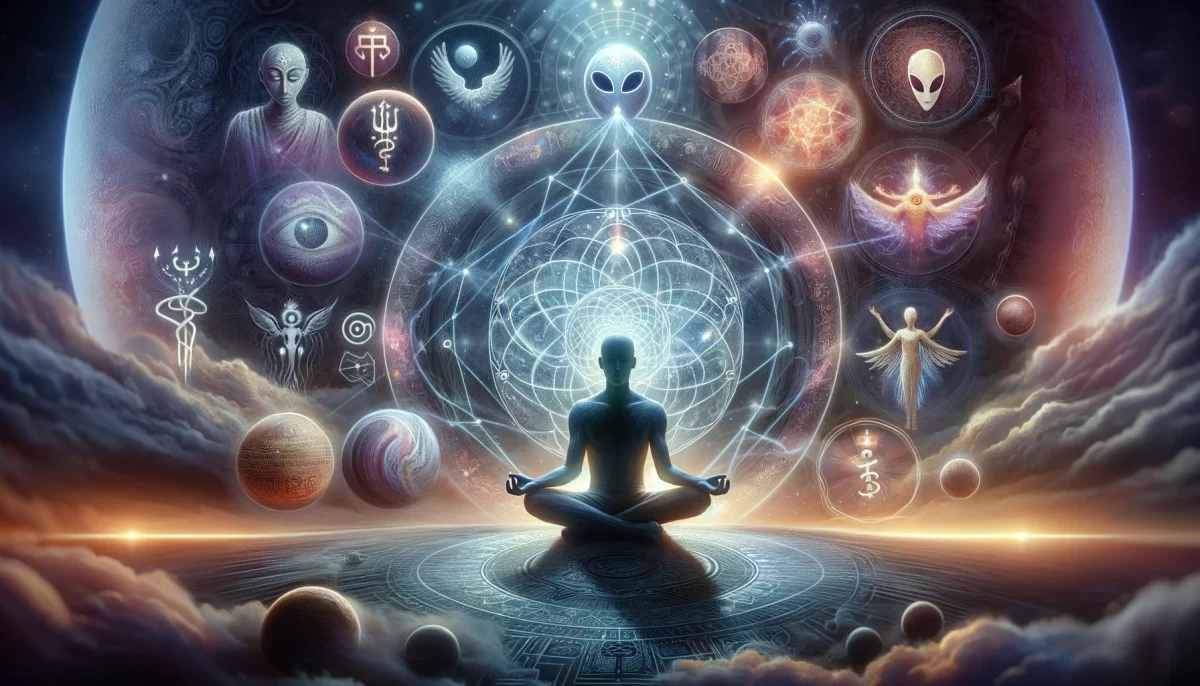
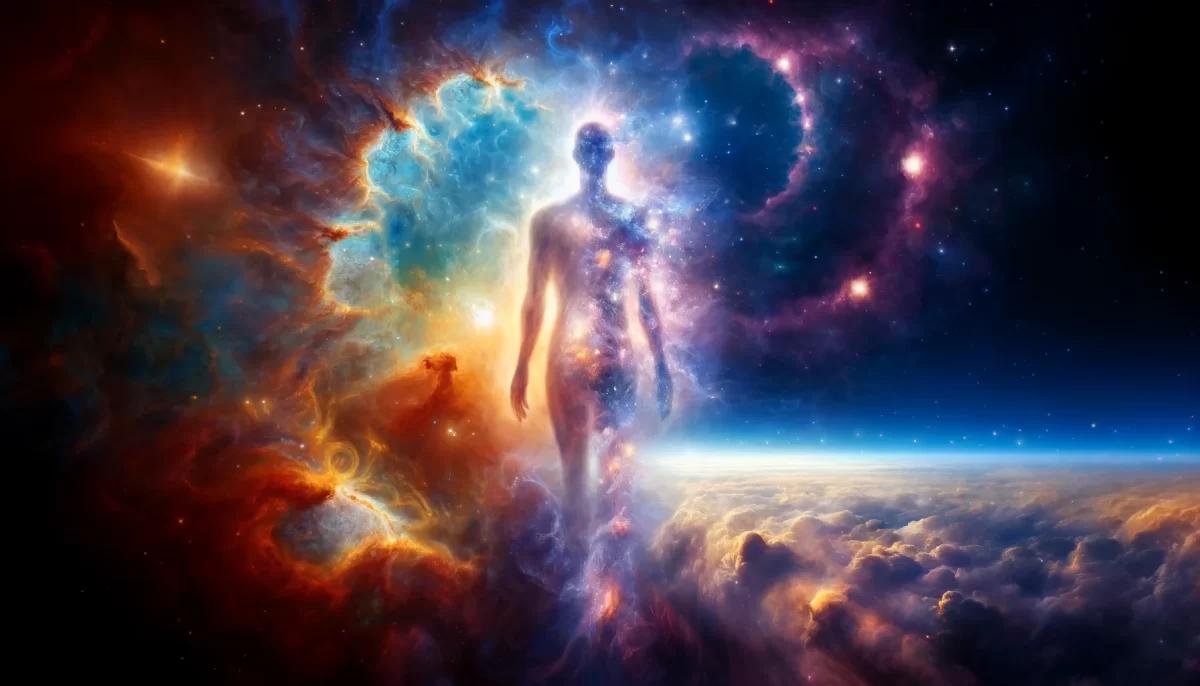

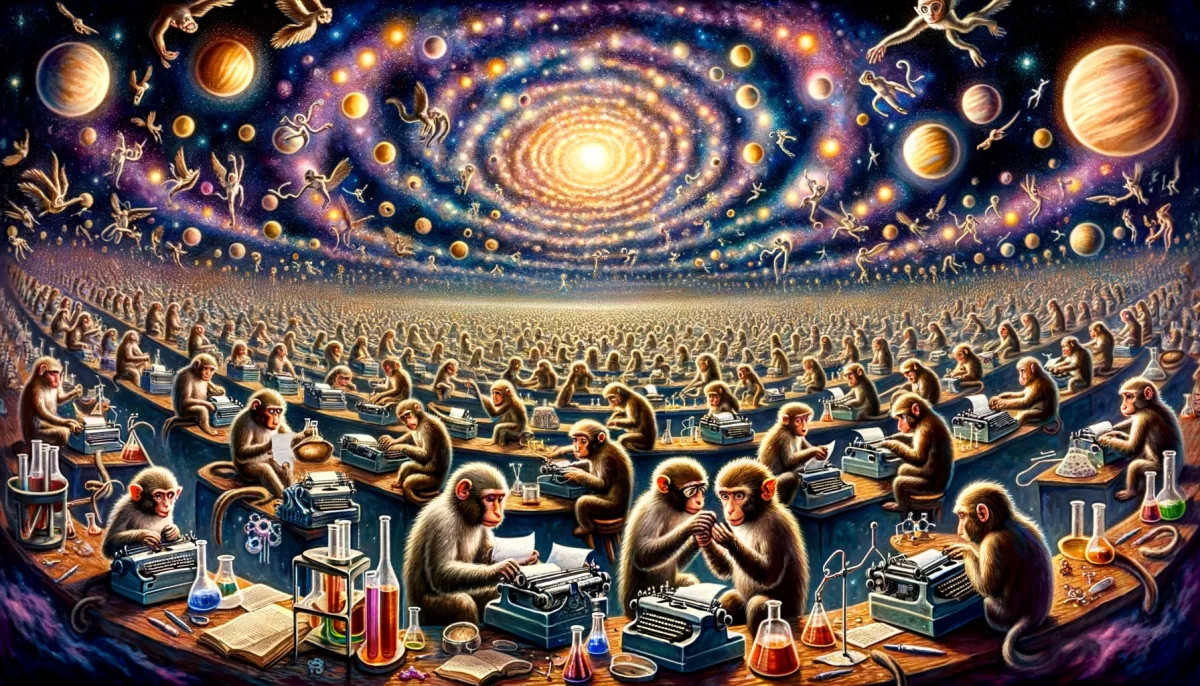
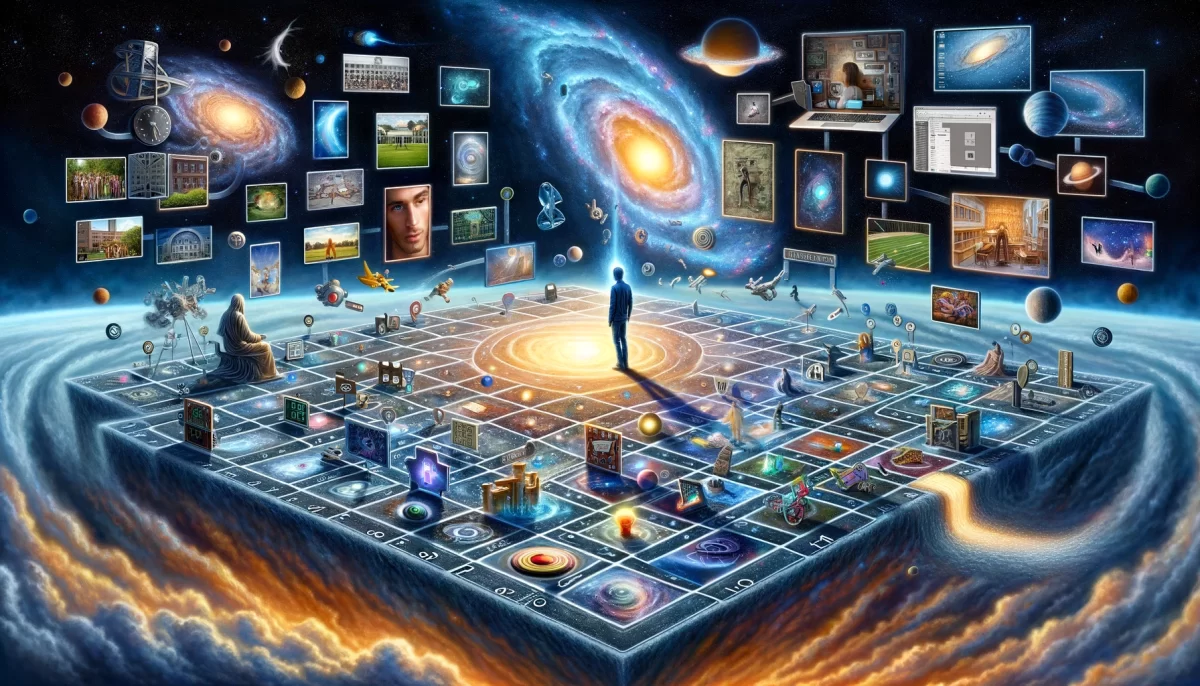

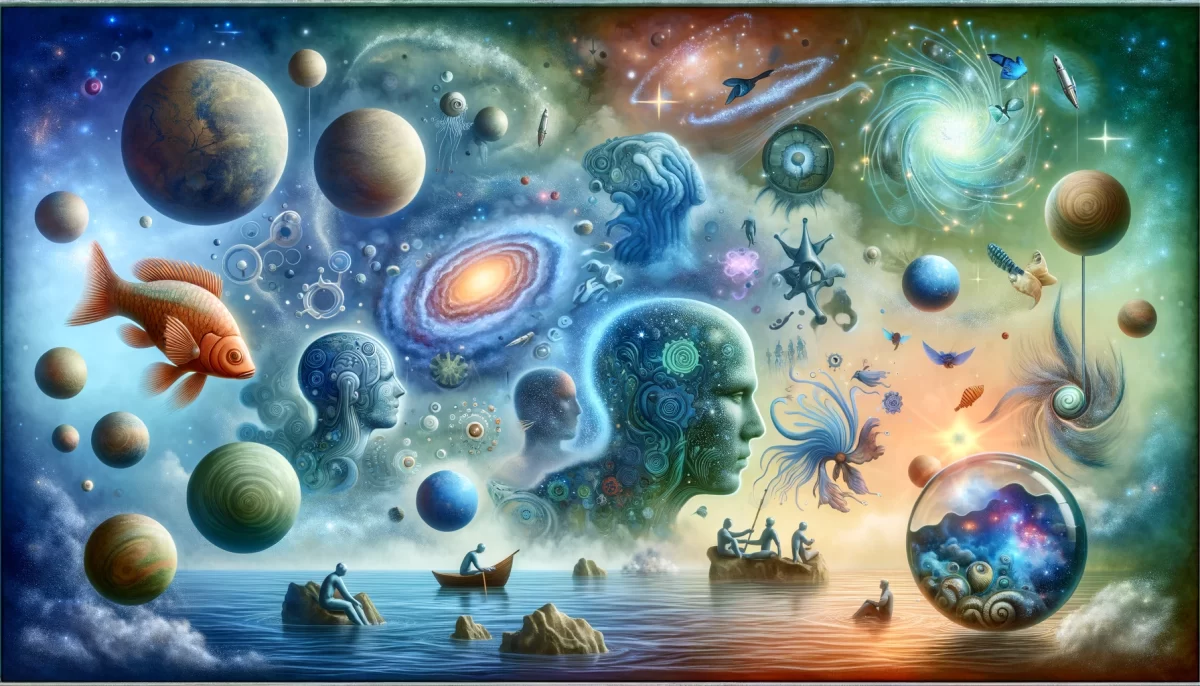
Leave a Reply